Effect of IFRS Adoption on Financial Reporting Quality in Australia
VerifiedAdded on 2022/09/05
|10
|2158
|15
Report
AI Summary
This report provides a comprehensive review of the effects of International Financial Reporting Standards (IFRS) adoption on financial reporting quality in Australia. It synthesizes findings from multiple academic articles, examining the impact of IFRS on various aspects, including bankruptcy prediction, analyst forecasts, and the value relevance of financial information. The studies reviewed explore the implications of IFRS adoption for local government entities, the accuracy of analyst forecasts, and changes in the relationship between financial information and stock prices. The report highlights key findings such as the improved accuracy of bankruptcy prediction models under IFRS, the influence of IFRS on analyst forecast accuracy, and the shifts in the value relevance of earnings and book value of equity. The analysis considers the transition from Australian Accounting Standards (AAS) to IFRS and its effects on the financial reports of Australian companies. The report concludes by emphasizing the importance of IFRS adoption for enhancing the transparency, comparability, and overall quality of financial reporting in the Australian context.
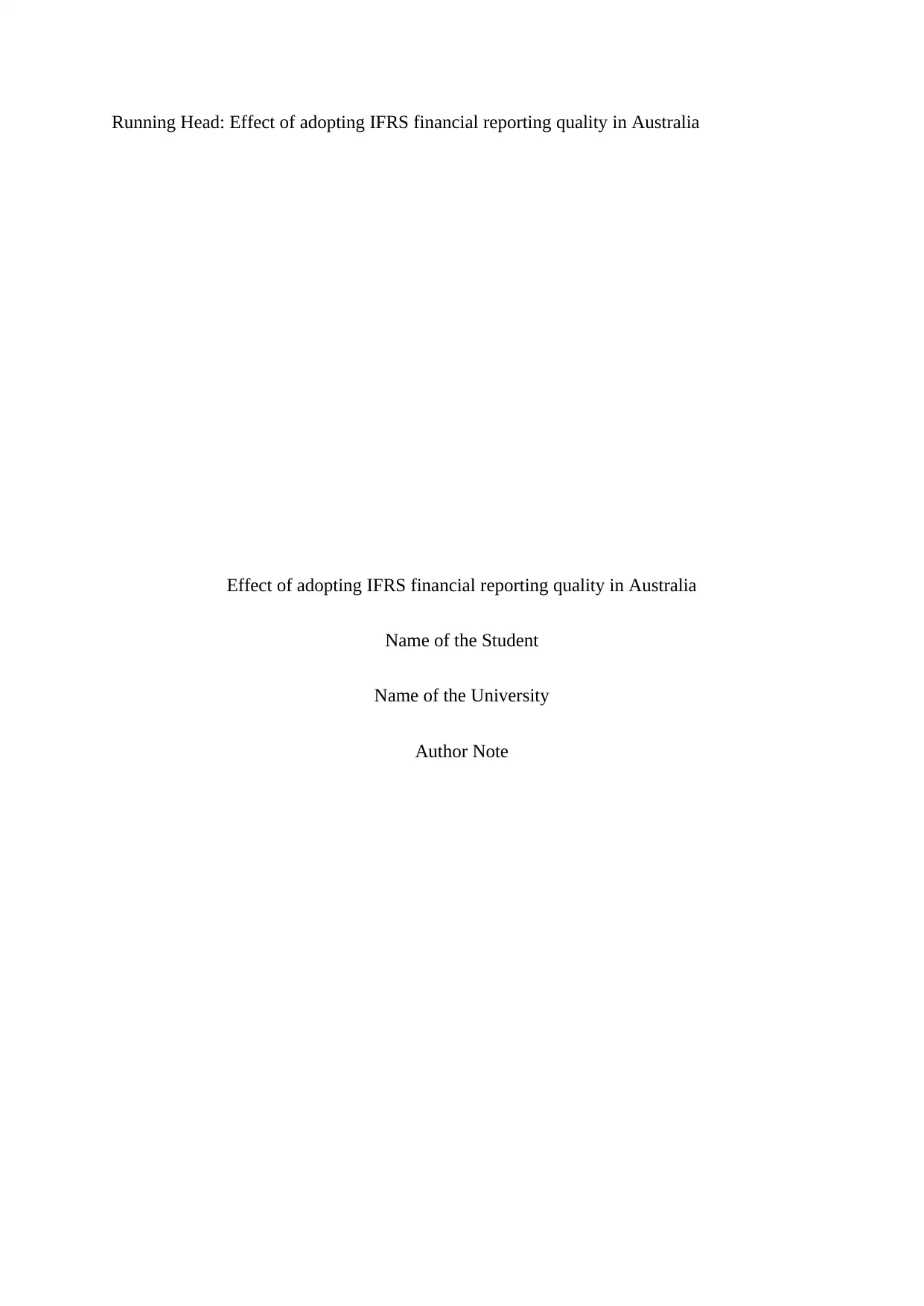
Running Head: Effect of adopting IFRS financial reporting quality in Australia
Effect of adopting IFRS financial reporting quality in Australia
Name of the Student
Name of the University
Author Note
Effect of adopting IFRS financial reporting quality in Australia
Name of the Student
Name of the University
Author Note
Paraphrase This Document
Need a fresh take? Get an instant paraphrase of this document with our AI Paraphraser

1
Effect of adopting IFRS financial reporting quality in Australia
Effect of adopting IFRS financial reporting quality in Australia
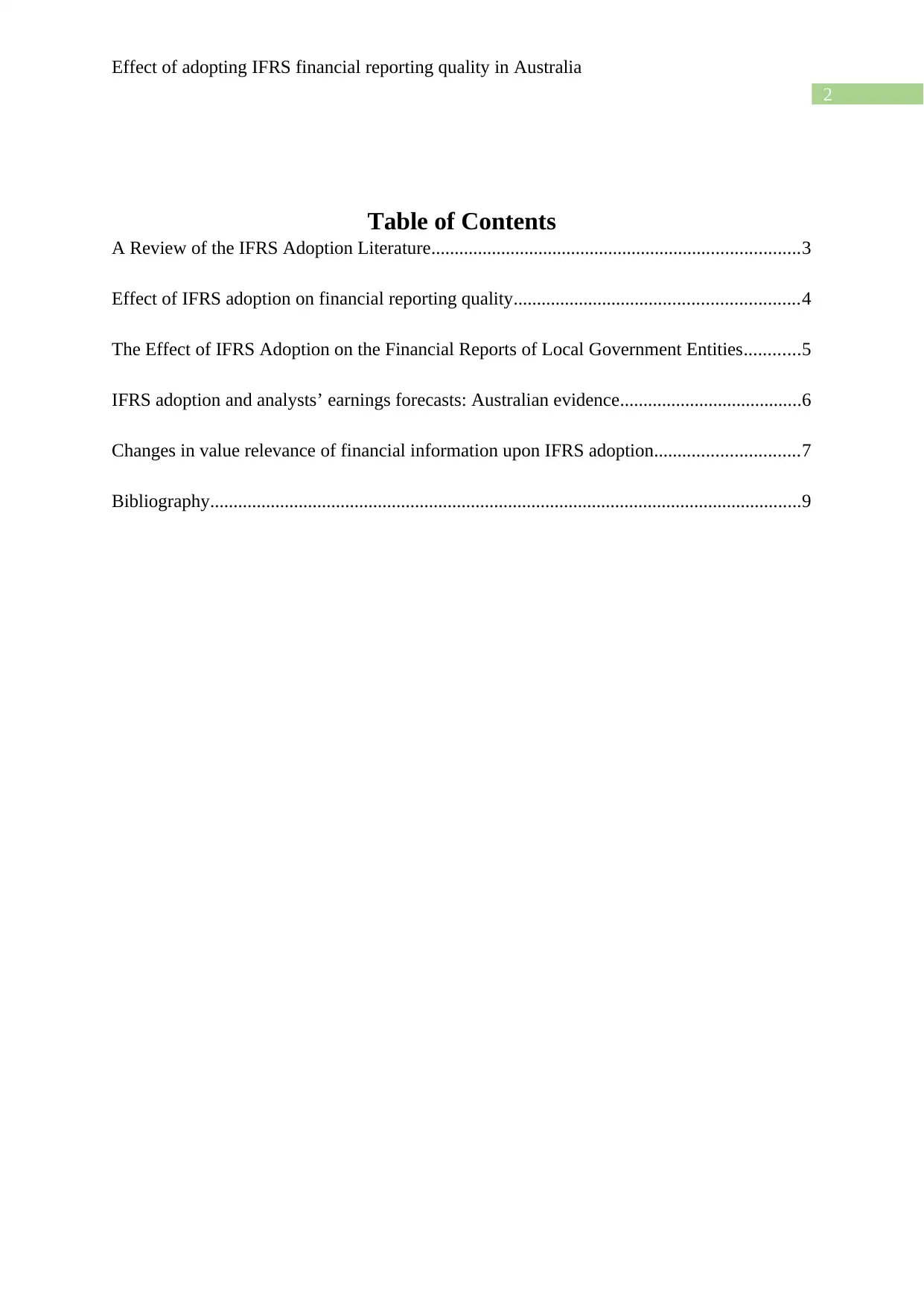
2
Effect of adopting IFRS financial reporting quality in Australia
Table of Contents
A Review of the IFRS Adoption Literature...............................................................................3
Effect of IFRS adoption on financial reporting quality.............................................................4
The Effect of IFRS Adoption on the Financial Reports of Local Government Entities............5
IFRS adoption and analysts’ earnings forecasts: Australian evidence.......................................6
Changes in value relevance of financial information upon IFRS adoption...............................7
Bibliography...............................................................................................................................9
Effect of adopting IFRS financial reporting quality in Australia
Table of Contents
A Review of the IFRS Adoption Literature...............................................................................3
Effect of IFRS adoption on financial reporting quality.............................................................4
The Effect of IFRS Adoption on the Financial Reports of Local Government Entities............5
IFRS adoption and analysts’ earnings forecasts: Australian evidence.......................................6
Changes in value relevance of financial information upon IFRS adoption...............................7
Bibliography...............................................................................................................................9
⊘ This is a preview!⊘
Do you want full access?
Subscribe today to unlock all pages.

Trusted by 1+ million students worldwide
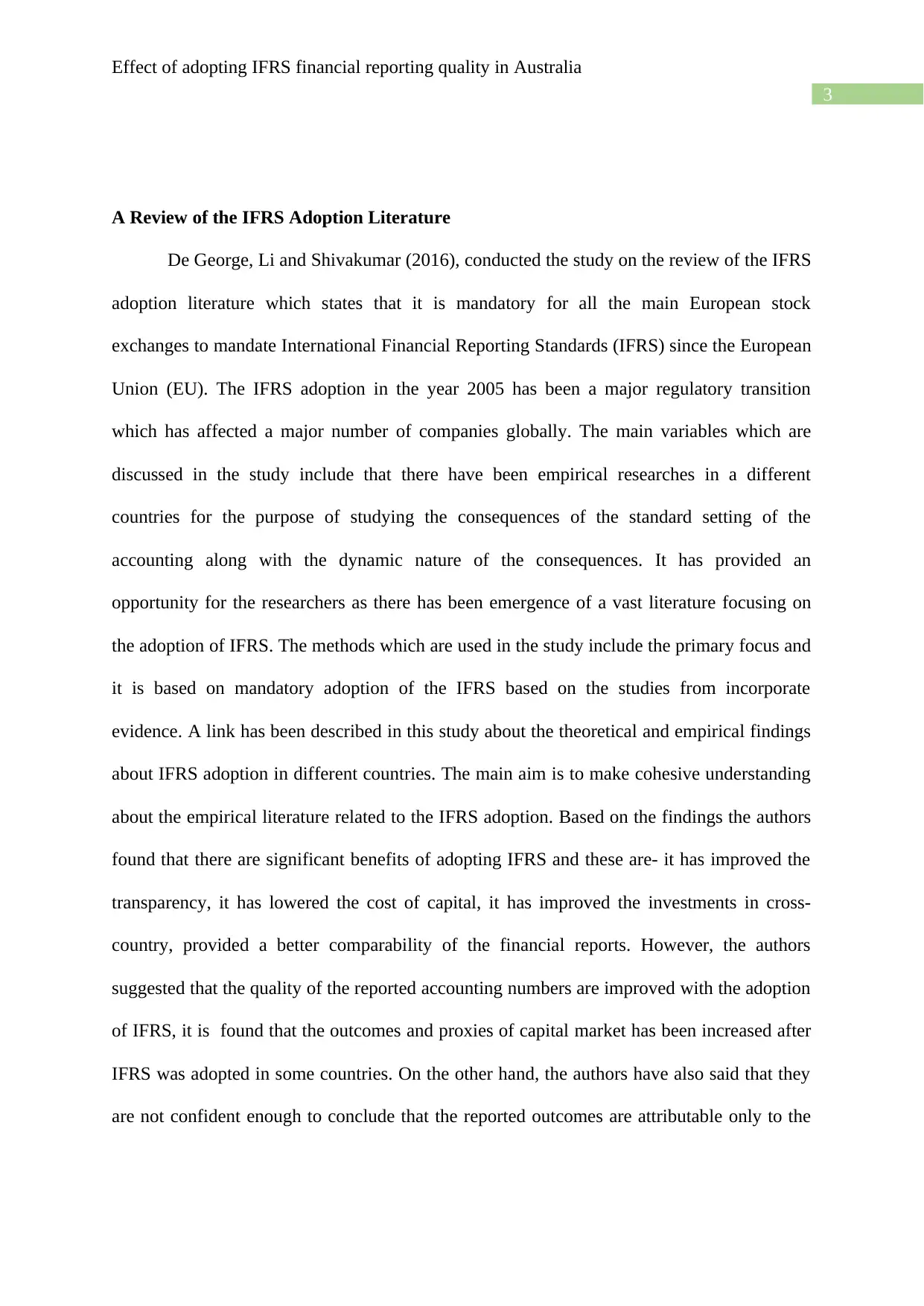
3
Effect of adopting IFRS financial reporting quality in Australia
A Review of the IFRS Adoption Literature
De George, Li and Shivakumar (2016), conducted the study on the review of the IFRS
adoption literature which states that it is mandatory for all the main European stock
exchanges to mandate International Financial Reporting Standards (IFRS) since the European
Union (EU). The IFRS adoption in the year 2005 has been a major regulatory transition
which has affected a major number of companies globally. The main variables which are
discussed in the study include that there have been empirical researches in a different
countries for the purpose of studying the consequences of the standard setting of the
accounting along with the dynamic nature of the consequences. It has provided an
opportunity for the researchers as there has been emergence of a vast literature focusing on
the adoption of IFRS. The methods which are used in the study include the primary focus and
it is based on mandatory adoption of the IFRS based on the studies from incorporate
evidence. A link has been described in this study about the theoretical and empirical findings
about IFRS adoption in different countries. The main aim is to make cohesive understanding
about the empirical literature related to the IFRS adoption. Based on the findings the authors
found that there are significant benefits of adopting IFRS and these are- it has improved the
transparency, it has lowered the cost of capital, it has improved the investments in cross-
country, provided a better comparability of the financial reports. However, the authors
suggested that the quality of the reported accounting numbers are improved with the adoption
of IFRS, it is found that the outcomes and proxies of capital market has been increased after
IFRS was adopted in some countries. On the other hand, the authors have also said that they
are not confident enough to conclude that the reported outcomes are attributable only to the
Effect of adopting IFRS financial reporting quality in Australia
A Review of the IFRS Adoption Literature
De George, Li and Shivakumar (2016), conducted the study on the review of the IFRS
adoption literature which states that it is mandatory for all the main European stock
exchanges to mandate International Financial Reporting Standards (IFRS) since the European
Union (EU). The IFRS adoption in the year 2005 has been a major regulatory transition
which has affected a major number of companies globally. The main variables which are
discussed in the study include that there have been empirical researches in a different
countries for the purpose of studying the consequences of the standard setting of the
accounting along with the dynamic nature of the consequences. It has provided an
opportunity for the researchers as there has been emergence of a vast literature focusing on
the adoption of IFRS. The methods which are used in the study include the primary focus and
it is based on mandatory adoption of the IFRS based on the studies from incorporate
evidence. A link has been described in this study about the theoretical and empirical findings
about IFRS adoption in different countries. The main aim is to make cohesive understanding
about the empirical literature related to the IFRS adoption. Based on the findings the authors
found that there are significant benefits of adopting IFRS and these are- it has improved the
transparency, it has lowered the cost of capital, it has improved the investments in cross-
country, provided a better comparability of the financial reports. However, the authors
suggested that the quality of the reported accounting numbers are improved with the adoption
of IFRS, it is found that the outcomes and proxies of capital market has been increased after
IFRS was adopted in some countries. On the other hand, the authors have also said that they
are not confident enough to conclude that the reported outcomes are attributable only to the
Paraphrase This Document
Need a fresh take? Get an instant paraphrase of this document with our AI Paraphraser
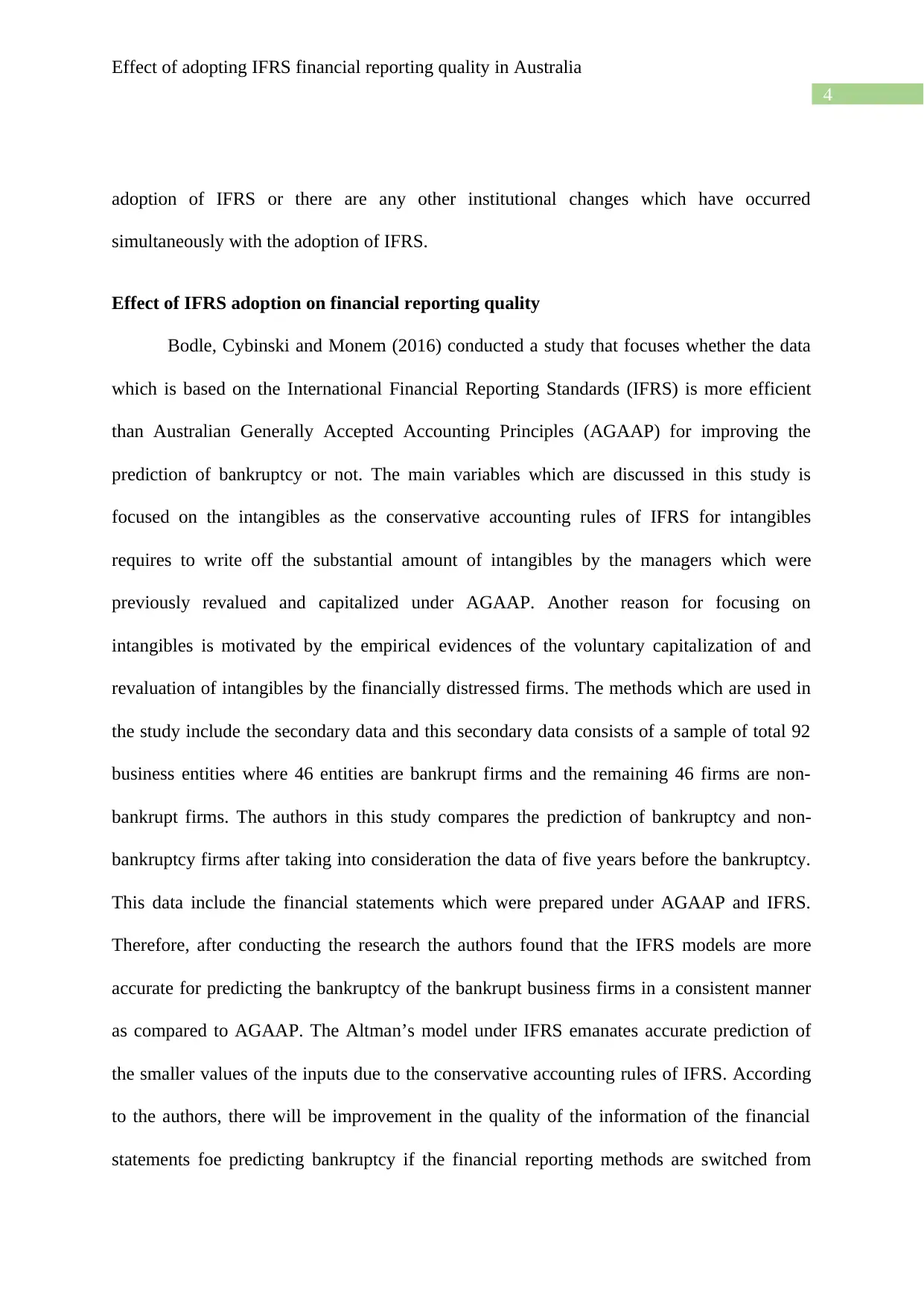
4
Effect of adopting IFRS financial reporting quality in Australia
adoption of IFRS or there are any other institutional changes which have occurred
simultaneously with the adoption of IFRS.
Effect of IFRS adoption on financial reporting quality
Bodle, Cybinski and Monem (2016) conducted a study that focuses whether the data
which is based on the International Financial Reporting Standards (IFRS) is more efficient
than Australian Generally Accepted Accounting Principles (AGAAP) for improving the
prediction of bankruptcy or not. The main variables which are discussed in this study is
focused on the intangibles as the conservative accounting rules of IFRS for intangibles
requires to write off the substantial amount of intangibles by the managers which were
previously revalued and capitalized under AGAAP. Another reason for focusing on
intangibles is motivated by the empirical evidences of the voluntary capitalization of and
revaluation of intangibles by the financially distressed firms. The methods which are used in
the study include the secondary data and this secondary data consists of a sample of total 92
business entities where 46 entities are bankrupt firms and the remaining 46 firms are non-
bankrupt firms. The authors in this study compares the prediction of bankruptcy and non-
bankruptcy firms after taking into consideration the data of five years before the bankruptcy.
This data include the financial statements which were prepared under AGAAP and IFRS.
Therefore, after conducting the research the authors found that the IFRS models are more
accurate for predicting the bankruptcy of the bankrupt business firms in a consistent manner
as compared to AGAAP. The Altman’s model under IFRS emanates accurate prediction of
the smaller values of the inputs due to the conservative accounting rules of IFRS. According
to the authors, there will be improvement in the quality of the information of the financial
statements foe predicting bankruptcy if the financial reporting methods are switched from
Effect of adopting IFRS financial reporting quality in Australia
adoption of IFRS or there are any other institutional changes which have occurred
simultaneously with the adoption of IFRS.
Effect of IFRS adoption on financial reporting quality
Bodle, Cybinski and Monem (2016) conducted a study that focuses whether the data
which is based on the International Financial Reporting Standards (IFRS) is more efficient
than Australian Generally Accepted Accounting Principles (AGAAP) for improving the
prediction of bankruptcy or not. The main variables which are discussed in this study is
focused on the intangibles as the conservative accounting rules of IFRS for intangibles
requires to write off the substantial amount of intangibles by the managers which were
previously revalued and capitalized under AGAAP. Another reason for focusing on
intangibles is motivated by the empirical evidences of the voluntary capitalization of and
revaluation of intangibles by the financially distressed firms. The methods which are used in
the study include the secondary data and this secondary data consists of a sample of total 92
business entities where 46 entities are bankrupt firms and the remaining 46 firms are non-
bankrupt firms. The authors in this study compares the prediction of bankruptcy and non-
bankruptcy firms after taking into consideration the data of five years before the bankruptcy.
This data include the financial statements which were prepared under AGAAP and IFRS.
Therefore, after conducting the research the authors found that the IFRS models are more
accurate for predicting the bankruptcy of the bankrupt business firms in a consistent manner
as compared to AGAAP. The Altman’s model under IFRS emanates accurate prediction of
the smaller values of the inputs due to the conservative accounting rules of IFRS. According
to the authors, there will be improvement in the quality of the information of the financial
statements foe predicting bankruptcy if the financial reporting methods are switched from
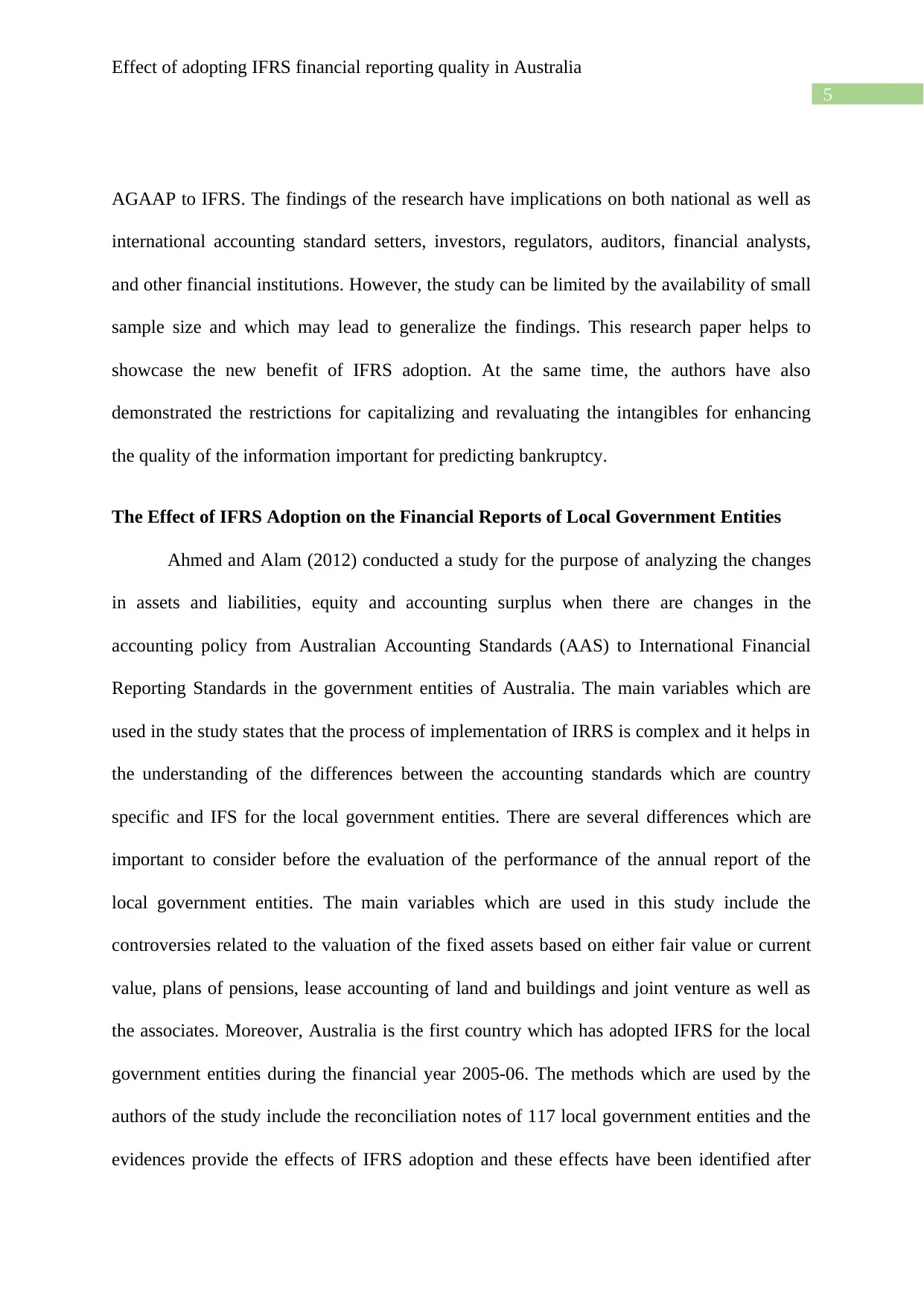
5
Effect of adopting IFRS financial reporting quality in Australia
AGAAP to IFRS. The findings of the research have implications on both national as well as
international accounting standard setters, investors, regulators, auditors, financial analysts,
and other financial institutions. However, the study can be limited by the availability of small
sample size and which may lead to generalize the findings. This research paper helps to
showcase the new benefit of IFRS adoption. At the same time, the authors have also
demonstrated the restrictions for capitalizing and revaluating the intangibles for enhancing
the quality of the information important for predicting bankruptcy.
The Effect of IFRS Adoption on the Financial Reports of Local Government Entities
Ahmed and Alam (2012) conducted a study for the purpose of analyzing the changes
in assets and liabilities, equity and accounting surplus when there are changes in the
accounting policy from Australian Accounting Standards (AAS) to International Financial
Reporting Standards in the government entities of Australia. The main variables which are
used in the study states that the process of implementation of IRRS is complex and it helps in
the understanding of the differences between the accounting standards which are country
specific and IFS for the local government entities. There are several differences which are
important to consider before the evaluation of the performance of the annual report of the
local government entities. The main variables which are used in this study include the
controversies related to the valuation of the fixed assets based on either fair value or current
value, plans of pensions, lease accounting of land and buildings and joint venture as well as
the associates. Moreover, Australia is the first country which has adopted IFRS for the local
government entities during the financial year 2005-06. The methods which are used by the
authors of the study include the reconciliation notes of 117 local government entities and the
evidences provide the effects of IFRS adoption and these effects have been identified after
Effect of adopting IFRS financial reporting quality in Australia
AGAAP to IFRS. The findings of the research have implications on both national as well as
international accounting standard setters, investors, regulators, auditors, financial analysts,
and other financial institutions. However, the study can be limited by the availability of small
sample size and which may lead to generalize the findings. This research paper helps to
showcase the new benefit of IFRS adoption. At the same time, the authors have also
demonstrated the restrictions for capitalizing and revaluating the intangibles for enhancing
the quality of the information important for predicting bankruptcy.
The Effect of IFRS Adoption on the Financial Reports of Local Government Entities
Ahmed and Alam (2012) conducted a study for the purpose of analyzing the changes
in assets and liabilities, equity and accounting surplus when there are changes in the
accounting policy from Australian Accounting Standards (AAS) to International Financial
Reporting Standards in the government entities of Australia. The main variables which are
used in the study states that the process of implementation of IRRS is complex and it helps in
the understanding of the differences between the accounting standards which are country
specific and IFS for the local government entities. There are several differences which are
important to consider before the evaluation of the performance of the annual report of the
local government entities. The main variables which are used in this study include the
controversies related to the valuation of the fixed assets based on either fair value or current
value, plans of pensions, lease accounting of land and buildings and joint venture as well as
the associates. Moreover, Australia is the first country which has adopted IFRS for the local
government entities during the financial year 2005-06. The methods which are used by the
authors of the study include the reconciliation notes of 117 local government entities and the
evidences provide the effects of IFRS adoption and these effects have been identified after
⊘ This is a preview!⊘
Do you want full access?
Subscribe today to unlock all pages.

Trusted by 1+ million students worldwide
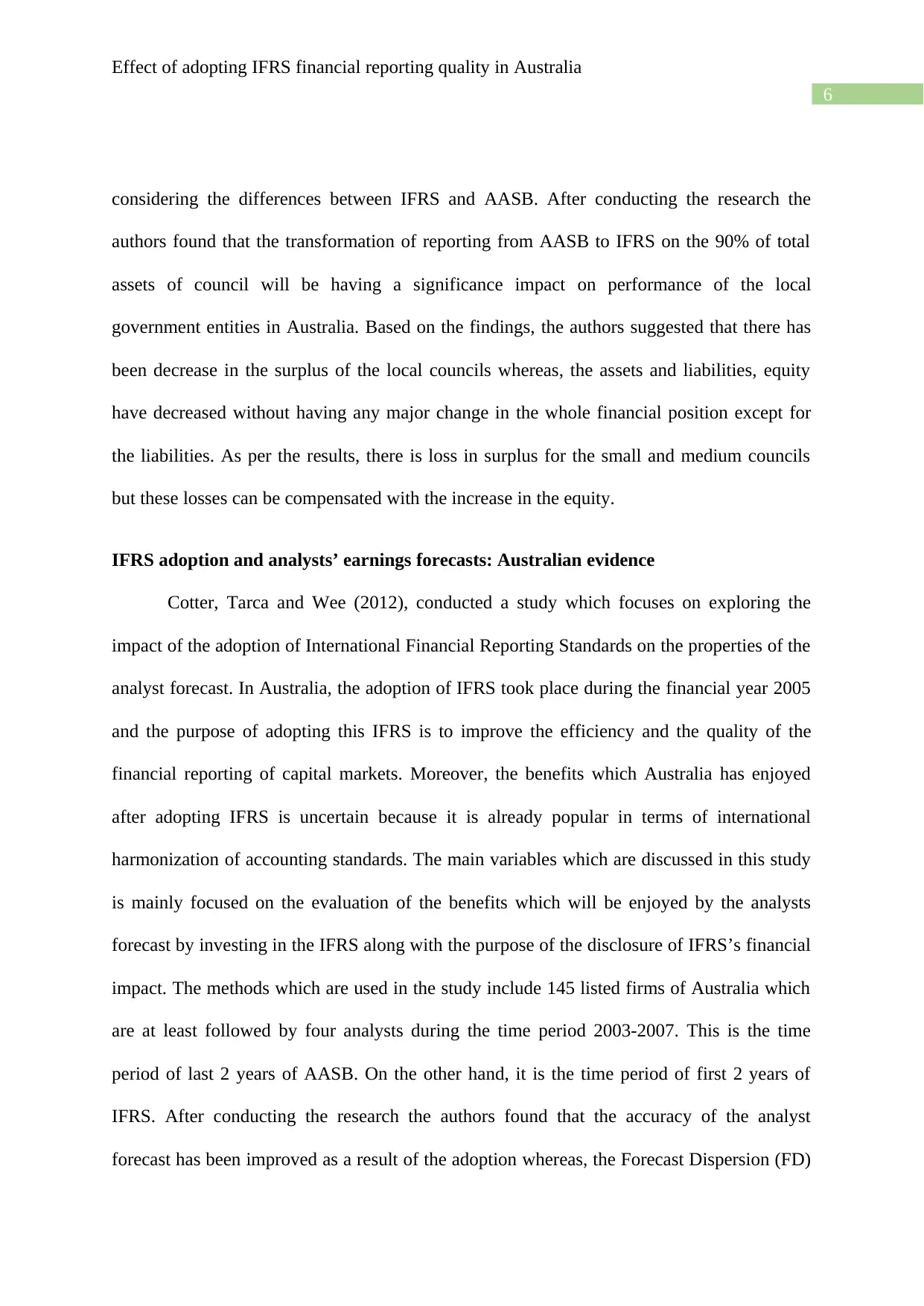
6
Effect of adopting IFRS financial reporting quality in Australia
considering the differences between IFRS and AASB. After conducting the research the
authors found that the transformation of reporting from AASB to IFRS on the 90% of total
assets of council will be having a significance impact on performance of the local
government entities in Australia. Based on the findings, the authors suggested that there has
been decrease in the surplus of the local councils whereas, the assets and liabilities, equity
have decreased without having any major change in the whole financial position except for
the liabilities. As per the results, there is loss in surplus for the small and medium councils
but these losses can be compensated with the increase in the equity.
IFRS adoption and analysts’ earnings forecasts: Australian evidence
Cotter, Tarca and Wee (2012), conducted a study which focuses on exploring the
impact of the adoption of International Financial Reporting Standards on the properties of the
analyst forecast. In Australia, the adoption of IFRS took place during the financial year 2005
and the purpose of adopting this IFRS is to improve the efficiency and the quality of the
financial reporting of capital markets. Moreover, the benefits which Australia has enjoyed
after adopting IFRS is uncertain because it is already popular in terms of international
harmonization of accounting standards. The main variables which are discussed in this study
is mainly focused on the evaluation of the benefits which will be enjoyed by the analysts
forecast by investing in the IFRS along with the purpose of the disclosure of IFRS’s financial
impact. The methods which are used in the study include 145 listed firms of Australia which
are at least followed by four analysts during the time period 2003-2007. This is the time
period of last 2 years of AASB. On the other hand, it is the time period of first 2 years of
IFRS. After conducting the research the authors found that the accuracy of the analyst
forecast has been improved as a result of the adoption whereas, the Forecast Dispersion (FD)
Effect of adopting IFRS financial reporting quality in Australia
considering the differences between IFRS and AASB. After conducting the research the
authors found that the transformation of reporting from AASB to IFRS on the 90% of total
assets of council will be having a significance impact on performance of the local
government entities in Australia. Based on the findings, the authors suggested that there has
been decrease in the surplus of the local councils whereas, the assets and liabilities, equity
have decreased without having any major change in the whole financial position except for
the liabilities. As per the results, there is loss in surplus for the small and medium councils
but these losses can be compensated with the increase in the equity.
IFRS adoption and analysts’ earnings forecasts: Australian evidence
Cotter, Tarca and Wee (2012), conducted a study which focuses on exploring the
impact of the adoption of International Financial Reporting Standards on the properties of the
analyst forecast. In Australia, the adoption of IFRS took place during the financial year 2005
and the purpose of adopting this IFRS is to improve the efficiency and the quality of the
financial reporting of capital markets. Moreover, the benefits which Australia has enjoyed
after adopting IFRS is uncertain because it is already popular in terms of international
harmonization of accounting standards. The main variables which are discussed in this study
is mainly focused on the evaluation of the benefits which will be enjoyed by the analysts
forecast by investing in the IFRS along with the purpose of the disclosure of IFRS’s financial
impact. The methods which are used in the study include 145 listed firms of Australia which
are at least followed by four analysts during the time period 2003-2007. This is the time
period of last 2 years of AASB. On the other hand, it is the time period of first 2 years of
IFRS. After conducting the research the authors found that the accuracy of the analyst
forecast has been improved as a result of the adoption whereas, the Forecast Dispersion (FD)
Paraphrase This Document
Need a fresh take? Get an instant paraphrase of this document with our AI Paraphraser
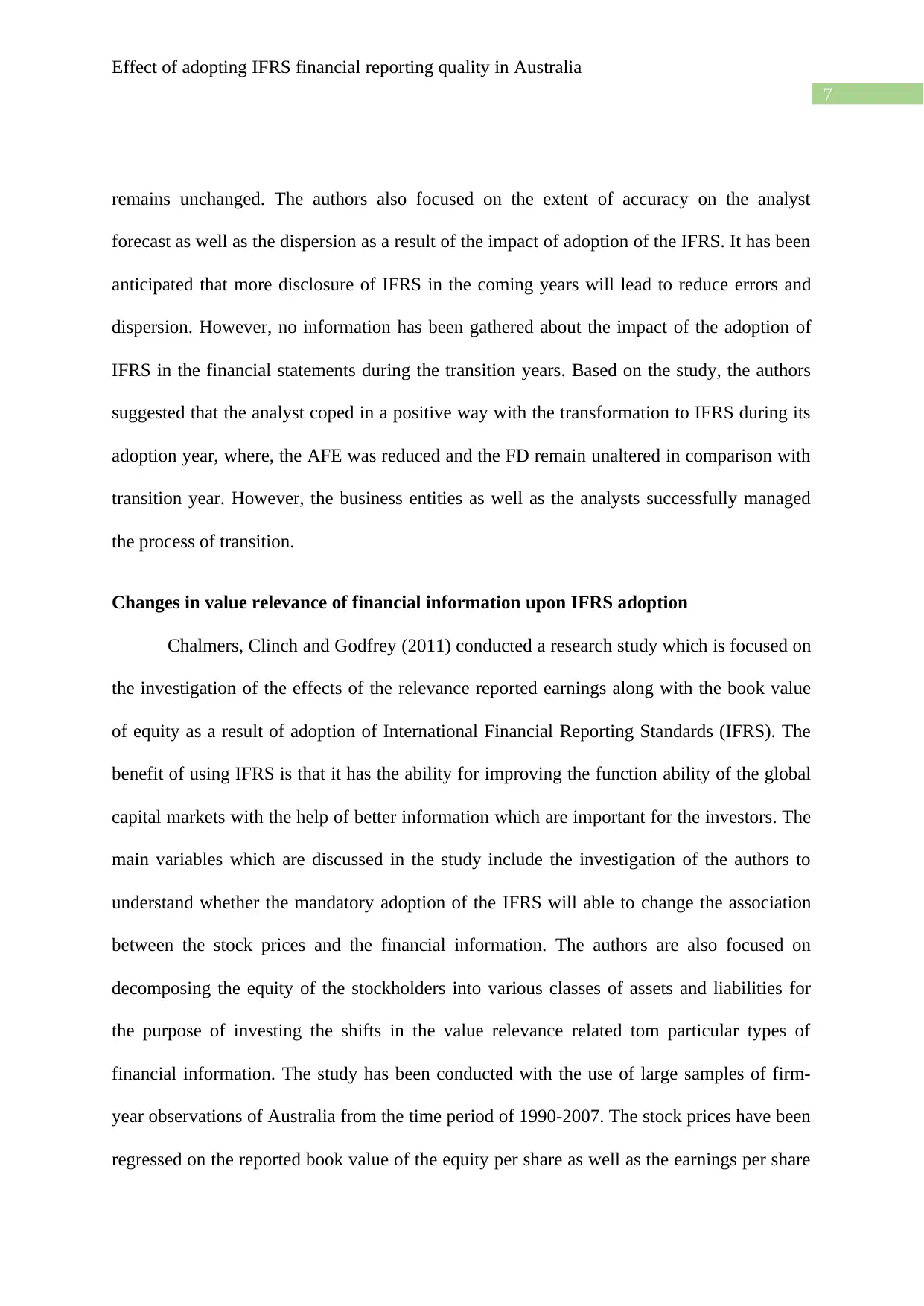
7
Effect of adopting IFRS financial reporting quality in Australia
remains unchanged. The authors also focused on the extent of accuracy on the analyst
forecast as well as the dispersion as a result of the impact of adoption of the IFRS. It has been
anticipated that more disclosure of IFRS in the coming years will lead to reduce errors and
dispersion. However, no information has been gathered about the impact of the adoption of
IFRS in the financial statements during the transition years. Based on the study, the authors
suggested that the analyst coped in a positive way with the transformation to IFRS during its
adoption year, where, the AFE was reduced and the FD remain unaltered in comparison with
transition year. However, the business entities as well as the analysts successfully managed
the process of transition.
Changes in value relevance of financial information upon IFRS adoption
Chalmers, Clinch and Godfrey (2011) conducted a research study which is focused on
the investigation of the effects of the relevance reported earnings along with the book value
of equity as a result of adoption of International Financial Reporting Standards (IFRS). The
benefit of using IFRS is that it has the ability for improving the function ability of the global
capital markets with the help of better information which are important for the investors. The
main variables which are discussed in the study include the investigation of the authors to
understand whether the mandatory adoption of the IFRS will able to change the association
between the stock prices and the financial information. The authors are also focused on
decomposing the equity of the stockholders into various classes of assets and liabilities for
the purpose of investing the shifts in the value relevance related tom particular types of
financial information. The study has been conducted with the use of large samples of firm-
year observations of Australia from the time period of 1990-2007. The stock prices have been
regressed on the reported book value of the equity per share as well as the earnings per share
Effect of adopting IFRS financial reporting quality in Australia
remains unchanged. The authors also focused on the extent of accuracy on the analyst
forecast as well as the dispersion as a result of the impact of adoption of the IFRS. It has been
anticipated that more disclosure of IFRS in the coming years will lead to reduce errors and
dispersion. However, no information has been gathered about the impact of the adoption of
IFRS in the financial statements during the transition years. Based on the study, the authors
suggested that the analyst coped in a positive way with the transformation to IFRS during its
adoption year, where, the AFE was reduced and the FD remain unaltered in comparison with
transition year. However, the business entities as well as the analysts successfully managed
the process of transition.
Changes in value relevance of financial information upon IFRS adoption
Chalmers, Clinch and Godfrey (2011) conducted a research study which is focused on
the investigation of the effects of the relevance reported earnings along with the book value
of equity as a result of adoption of International Financial Reporting Standards (IFRS). The
benefit of using IFRS is that it has the ability for improving the function ability of the global
capital markets with the help of better information which are important for the investors. The
main variables which are discussed in the study include the investigation of the authors to
understand whether the mandatory adoption of the IFRS will able to change the association
between the stock prices and the financial information. The authors are also focused on
decomposing the equity of the stockholders into various classes of assets and liabilities for
the purpose of investing the shifts in the value relevance related tom particular types of
financial information. The study has been conducted with the use of large samples of firm-
year observations of Australia from the time period of 1990-2007. The stock prices have been
regressed on the reported book value of the equity per share as well as the earnings per share
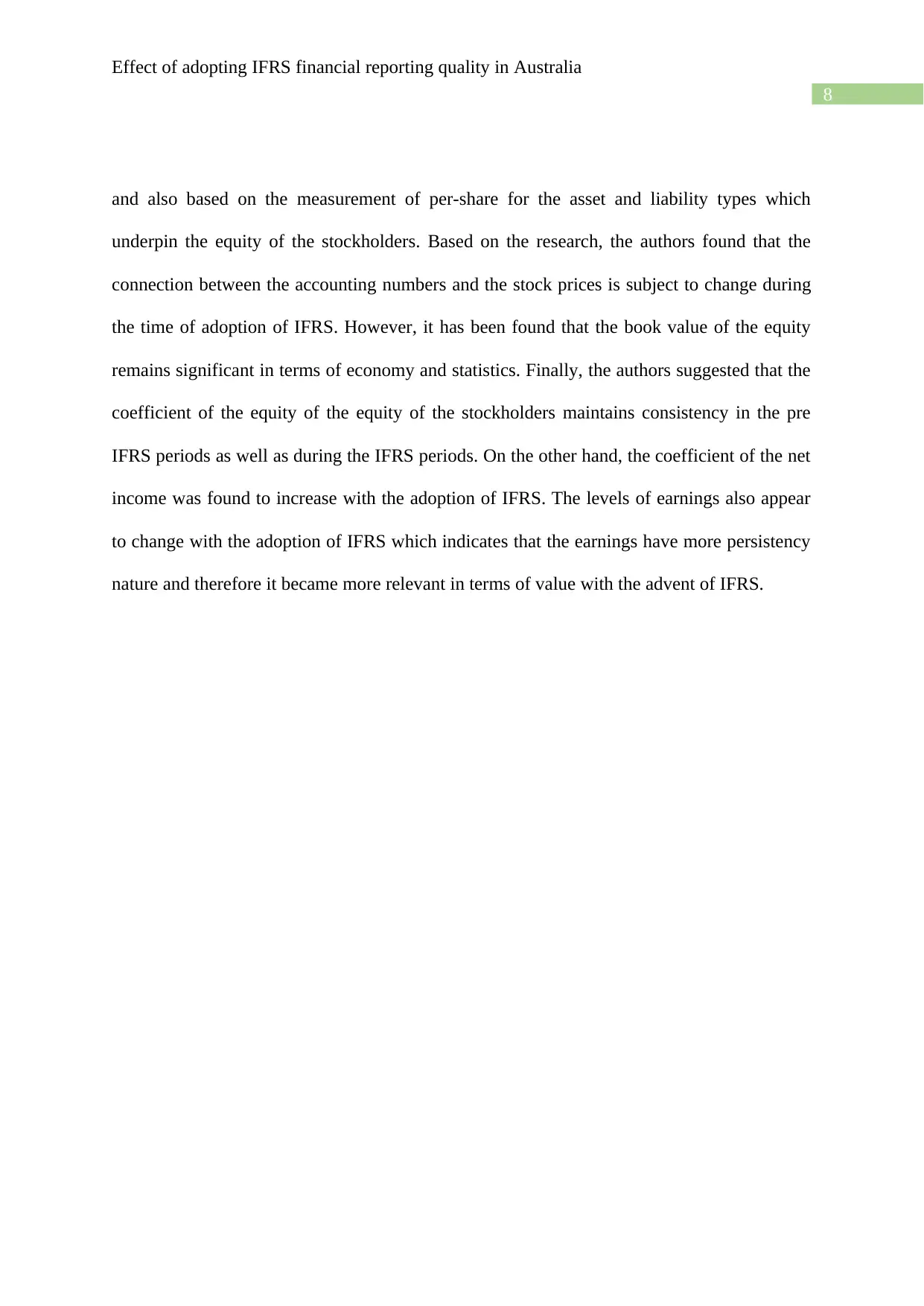
8
Effect of adopting IFRS financial reporting quality in Australia
and also based on the measurement of per-share for the asset and liability types which
underpin the equity of the stockholders. Based on the research, the authors found that the
connection between the accounting numbers and the stock prices is subject to change during
the time of adoption of IFRS. However, it has been found that the book value of the equity
remains significant in terms of economy and statistics. Finally, the authors suggested that the
coefficient of the equity of the equity of the stockholders maintains consistency in the pre
IFRS periods as well as during the IFRS periods. On the other hand, the coefficient of the net
income was found to increase with the adoption of IFRS. The levels of earnings also appear
to change with the adoption of IFRS which indicates that the earnings have more persistency
nature and therefore it became more relevant in terms of value with the advent of IFRS.
Effect of adopting IFRS financial reporting quality in Australia
and also based on the measurement of per-share for the asset and liability types which
underpin the equity of the stockholders. Based on the research, the authors found that the
connection between the accounting numbers and the stock prices is subject to change during
the time of adoption of IFRS. However, it has been found that the book value of the equity
remains significant in terms of economy and statistics. Finally, the authors suggested that the
coefficient of the equity of the equity of the stockholders maintains consistency in the pre
IFRS periods as well as during the IFRS periods. On the other hand, the coefficient of the net
income was found to increase with the adoption of IFRS. The levels of earnings also appear
to change with the adoption of IFRS which indicates that the earnings have more persistency
nature and therefore it became more relevant in terms of value with the advent of IFRS.
⊘ This is a preview!⊘
Do you want full access?
Subscribe today to unlock all pages.

Trusted by 1+ million students worldwide
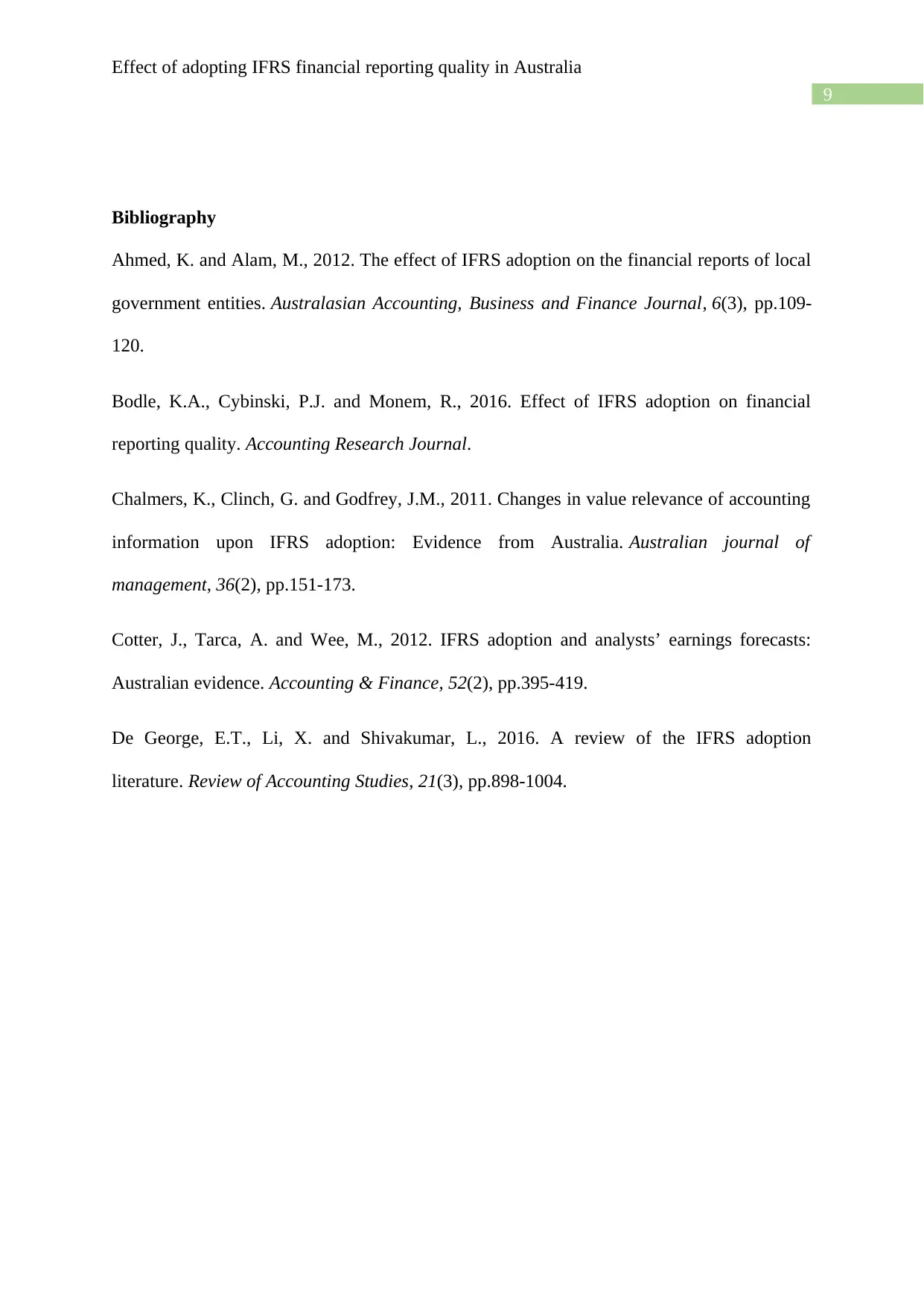
9
Effect of adopting IFRS financial reporting quality in Australia
Bibliography
Ahmed, K. and Alam, M., 2012. The effect of IFRS adoption on the financial reports of local
government entities. Australasian Accounting, Business and Finance Journal, 6(3), pp.109-
120.
Bodle, K.A., Cybinski, P.J. and Monem, R., 2016. Effect of IFRS adoption on financial
reporting quality. Accounting Research Journal.
Chalmers, K., Clinch, G. and Godfrey, J.M., 2011. Changes in value relevance of accounting
information upon IFRS adoption: Evidence from Australia. Australian journal of
management, 36(2), pp.151-173.
Cotter, J., Tarca, A. and Wee, M., 2012. IFRS adoption and analysts’ earnings forecasts:
Australian evidence. Accounting & Finance, 52(2), pp.395-419.
De George, E.T., Li, X. and Shivakumar, L., 2016. A review of the IFRS adoption
literature. Review of Accounting Studies, 21(3), pp.898-1004.
Effect of adopting IFRS financial reporting quality in Australia
Bibliography
Ahmed, K. and Alam, M., 2012. The effect of IFRS adoption on the financial reports of local
government entities. Australasian Accounting, Business and Finance Journal, 6(3), pp.109-
120.
Bodle, K.A., Cybinski, P.J. and Monem, R., 2016. Effect of IFRS adoption on financial
reporting quality. Accounting Research Journal.
Chalmers, K., Clinch, G. and Godfrey, J.M., 2011. Changes in value relevance of accounting
information upon IFRS adoption: Evidence from Australia. Australian journal of
management, 36(2), pp.151-173.
Cotter, J., Tarca, A. and Wee, M., 2012. IFRS adoption and analysts’ earnings forecasts:
Australian evidence. Accounting & Finance, 52(2), pp.395-419.
De George, E.T., Li, X. and Shivakumar, L., 2016. A review of the IFRS adoption
literature. Review of Accounting Studies, 21(3), pp.898-1004.
1 out of 10
Related Documents
Your All-in-One AI-Powered Toolkit for Academic Success.
+13062052269
info@desklib.com
Available 24*7 on WhatsApp / Email
![[object Object]](/_next/static/media/star-bottom.7253800d.svg)
Unlock your academic potential
Copyright © 2020–2026 A2Z Services. All Rights Reserved. Developed and managed by ZUCOL.




